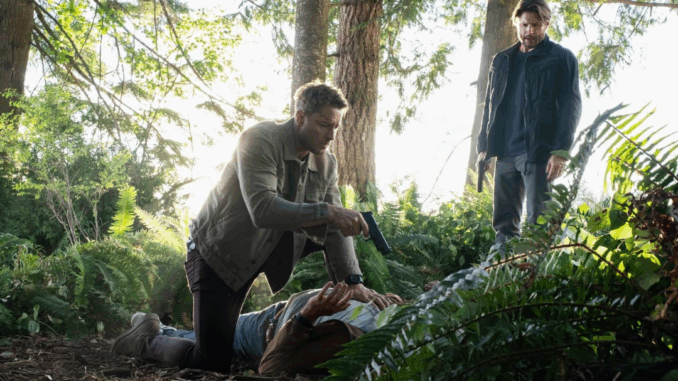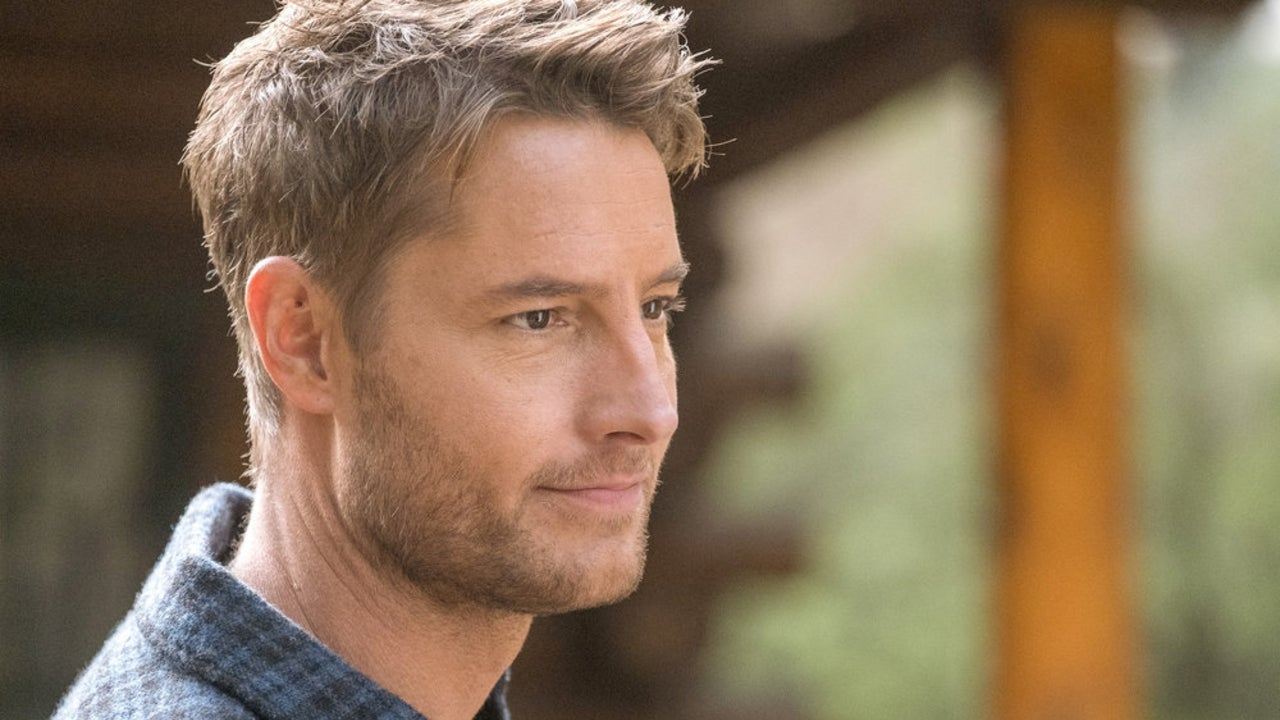
If you’re a fan of the hit drama Tracker starring Justin Hartley, you’re probably wondering: what’s next? Well, here’s the kicker—Justin just revealed that Season 3 is going to be very different than what we’ve seen before. Not just slight tweaks—this is a shift in the show’s DNA. Let’s break down what that means, why it matters, and how it might change your entire experience of the series.
1. The Big Change: Colter Is No Longer Just Chasing
One of the biggest revelations: Colter Shaw—the character Justin Hartley plays—is no longer simply the hunter of missing persons. This season, he’s being hunted. Justin puts it plainly: instead of him always going after someone, now someone is going after him. That flips the script in a huge way.
That means the familiar pattern we loved (cases of the week, rescue missions, the expert tracker solving problems) is still there—but now it has a major twist. The stakes have just gone up.
2. Why This Shift Matters for the Show’s Tone
When a show changes its structure like this, you feel it. It’s like changing from comfortable shoes to hiking boots—the terrain gets tougher, the pace changes, and you’re aware of every step. For Tracker, this means: more vulnerability for Colter, more tension, more uncertainty.
Previously we knew Colter had the upper hand. Now? He has to watch his back. That variable alone refreshes the tone.
3. Keeping the Procedural Roots While Evolving
Here’s the smart part: although this change is dramatic, the show isn’t abandoning what made it work. Justin emphasised that the weekly case format remains important—they still want that familiar rhythm. But layered on top is a more serialized arc.
So you’re getting your weekly “mini-adventures” and a bigger story that runs through the season. That combo can keep both casual viewers and die-hard fans engaged.
4. What It Means for Colter Shaw’s Character Arc
Colter’s evolution has always been part of the show’s promise. In earlier seasons he helped others find missing people, but this time he faces his own missing pieces. He pursues his past, his family, maybe his father’s death or hidden secrets. Now that means he might become subject to pursuit himself—emotionally, physically, or both.
That kind of arc brings depth. It means we’ll see more of his backstory, his flaws, his fears. Which in turn makes the show richer.

5. How Family & Relationships Come Into Play
The change isn’t just about Colter doing different work—it’s about how the people around him have to respond. If he’s hunted, his family, his support team, maybe his estranged brother—all of them become part of the story in a different way.
Relationships will shift, alliances may change, trust will be tested. Expect more emotional weight.
6. Supporting Cast: New Roles, Bigger Stakes
With this new structure, the supporting characters aren’t just background—they play bigger roles. When the lead character is vulnerable, the ensemble must carry more.
That means characters you loved or tolerated might step up. We might see someone unexpected become central. That can refresh the whole show’s dynamic.
7. How The Change Impacts Viewer Experience
For you, as a viewer, this means: you’ll feel less safe. In earlier seasons you might expect Colter to get the job done. Now you might wonder if he’ll make it out. That uncertainty makes each scene more electric.
It also invites deeper investment: you’re not just watching a successful tracker, you’re watching someone who could be the one in danger. Your emotional stake rises.
8. Why the Producers Are Making This Move
Why now? A few reasons:
-
To prevent the show from becoming formulaic.
-
To deepen the back-story and emotional stakes.
-
To keep viewers excited and invested beyond just “case solved, end of episode.”
Justin has spoken about the need for evolution in the character and the series. This isn’t change for change’s sake—it’s change to keep things fresh.
9. What to Watch For: Storylines & Themes
Here’s what you should keep an eye on in Season 3:
-
Moments where Colter is on the defensive.
-
Flashbacks or reveals about his past.
-
Shifts in his team dynamics (who helps, who watches).
-
Scenes that feel less “job” and more “survival.”
-
Emotional pay-offs instead of just plot resolutions.
10. Procedural vs. Serialized: A Balancing Act
Many shows have one or the other—they either do episodic mysteries or long arcs. Tracker is walking the line. With this new shift, the balance leans slightly more toward serialization—but with the comfort of the procedural still intact.
That means you get emotional payoff and the satisfaction of weekly closure. That’s a smart strategy for longevity.
11. How Character Changes Impact Viewing Experience
When characters evolve, the viewing experience shifts. Suddenly, you’re not just watching what happens this episode—you’re tracking where these people are going. That makes the journey richer.
It also means emotional investment deepens. When you’ve seen a character struggle, grow, change—you feel it when they succeed or fail. That’s the power of future-focused character storytelling.
12. What Could Explore: Unexpected Risks Ahead
Here are risks the show might take (and we’re excited about this):
-
Colter crosses moral lines. He’s no longer the hero in perfect light—he’s flawed, vulnerable.
-
Family betrayal or collaboration—someone close might become an adversary.
-
Shifting allegiances—characters you trusted could change.
-
When the hunter becomes hunted, the world flips—case becomes personal.
Those shifts make the show bold. They raise stakes. They make you care.
13. Will Characters Return or Exit?
Change often means goodbyes—but not always forever. Justin and the production have indicated that while some characters depart, they’re not necessarily gone for good.
A future revealed doesn’t always mean an exit. It can mean new roles, new phases. For fans, that means hope. For the story, it means room to explore.
14. Why Justin Hartley’s Role as Executive Producer Matters
Justin isn’t just the star—he’s an executive producer. That means he has influence over creative decisions, including character futures. When he comments on where characters are going, it carries weight.
The future revealed isn’t accidental—it’s intentional. So when Justin says this is evolution, you can trust it’s baked into the season’s blueprint.
15. Final Thoughts: A Future Worth Watching
So what’s the takeaway? If you’re wondering whether Season 3 of Tracker is more of the same—the answer is no. It’s more than that. Justin Hartley’s revelation about Colter being chased instead of doing the chasing signals a bold new chapter.
It’s not just an action procedural anymore—it’s an emotional journey, an evolving character study, and a show ready to raise the bar. If you’re tuning in, you’re in for more than you expected—and that’s a very good thing.
Conclusion
The one big change that Justin Hartley revealed about Tracker Season 3—Colter Shaw being pursued rather than the pursuer—is a game-changer. It refreshes the show’s format, deepens its character work, and raises the stakes in a way that could redefine the series. If you’ve been enjoying Tracker so far, get ready: the next ride is going to hit harder, feel more personal, and maybe keep you on the edge of your seat in new ways. Stay ready, because this turn in the road matters.
FAQs
Q1: What exactly did Justin Hartley say about the difference in Season 3?
He said that instead of his character always being the one tracking someone down, in Season 3 he will find himself on the other side—being tracked. That flips the show’s narrative dynamic.
Q2: Will the weekly case format of Tracker change?
No. The show is still keeping its episodic roots. You’ll still see weekly missions and missing-person cases. But embedded within that is a larger serialized story that spans the season.
Q3: How will this change affect Colter’s allies and team?
With Colter under threat, his team and family dynamics will shift. Supporting characters may take on bigger roles, alliances may shift, and relationships will be tested.
Q4: Will new characters be introduced to facilitate this shift?
Yes—changes in character lineup and role prominence are part of this evolution. Some familiar faces might exit or reduce presence, and new faces may arrive, contributing to the show’s fresh direction.
Q5: Is this change likely to improve the show’s quality or risk alienating fans?
While any change carries risk, this one seems strategically designed to enhance the show. By adding vulnerability and higher stakes while preserving core strengths, it has a strong chance of improving the series and keeping fans engaged.
